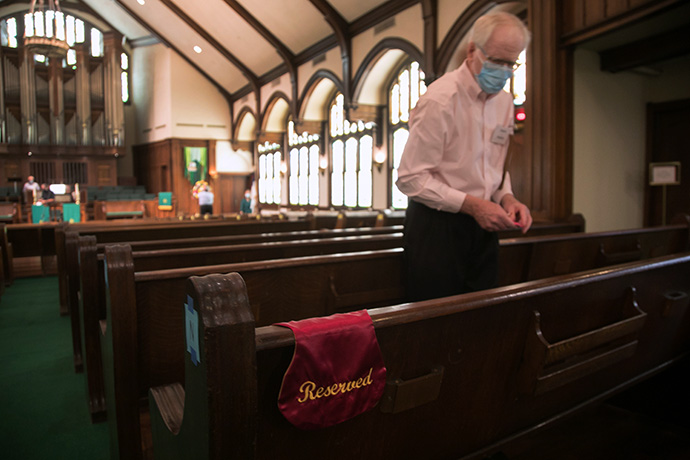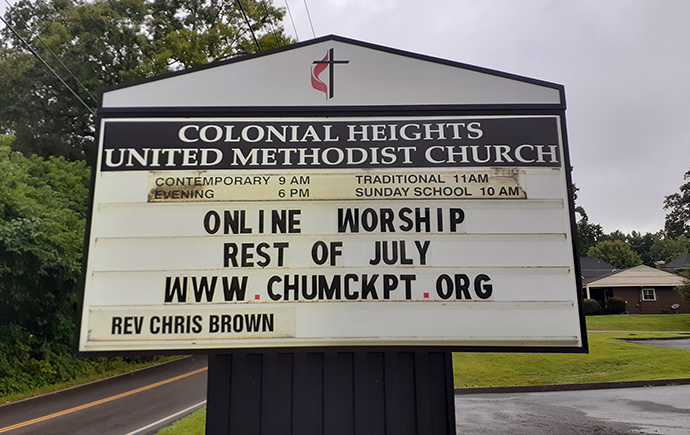Laurel Heights United Methodist Church went about three months with online worship only, then gathered again in its lovely old Gothic sanctuary, with everyone wearing masks and keeping their distance.
But it was one and done for the San Antonio church. COVID-19 cases locally began to spike just ahead of the June 14 reopening.
“We had sticker shock. We saw all these COVID numbers,” said the Rev. Paul Escamilla, Laurel Heights’ pastor. “We knew even when we gathered we wouldn’t be back the following Sunday, and we haven’t been back since.”
Thousands of United Methodist churches — including entire conferences — have dealt with the challenge of being unable to meet in person since the COVID-19 pandemic gripped the U.S. and other parts of the world before Easter.
But in recent weeks some churches that had implemented safety protocols and carefully reopened have had to close their doors again due to rising case numbers of the coronavirus locally.
Laurel Heights had just one Sunday worshipping in person. First United Methodist Church in Baton Rouge, Louisiana, had two.
“When we opened back up, it really lifted my spirits,” said the Rev. Brady Whitton, pastor. “So to shut things back down again hurt. At the same time, shutting down again helped me settle into the fact that this is going to be our reality for a while.”

Steve Haney checks seating restrictions for the Sunday, June 14 worship service at Laurel Heights United Methodist Church, in San Antonio. Haney, who teaches at the UT Health San Antonio Dental School, serves on a COVID-19 team at the church that has come up with criteria and even a color-coded chart to guide decisions on opening and closing. Laurel Heights closed again for in-person worship the following Sunday and remains closed due to high COVID-19 case numbers in the area. Photo by David Smith, courtesy of Laurel Heights United Methodist Church.
The Holston Conference, covering parts of Tennessee, Virginia and Georgia, closed all its churches as the pandemic spread in March. Bishop Mary Virginia Taylor created a task force that includes medical experts and relies heavily on the Harvard Global Health Institute’s ongoing, color-coded assessment of the COVID-19 risk in U.S. counties.
Eventually the conference allowed churches in safe areas to reopen under strict guidelines. But because of rising COVID-19 risk levels, some Holston superintendents have put in a fresh closure directive in hard-hit counties. Four districts are again closed altogether for in-person worship.
Of Holston’s 858 churches, the number closed for inside, in-person worship had climbed back to 687 as of July 29, due to the higher case numbers.
“(The coronavirus) doesn’t respect denominations or anything else,” Taylor said. “We’re just trying to keep our people as safe and healthy as possible.”
Kingston United Methodist Church, in Kingston, Tennessee, is part of the Holston Conference, and just went back to online worship only, after six Sundays of services in the sanctuary.
“It felt right to do it, but it was hard,” said the Rev. Charlie Harrison, pastor. “After six weeks of being back together, we’d started developing a little bit of a routine. People were getting excited, even though our numbers were only a third (of pre-pandemic attendance).”
Another Holston Conference church, Colonial Heights United Methodist Church in Kingsport, Tennessee, had in-person worship again on June 28 and July 5. But the Rev. Chris Brown, pastor, spent much of Friday, July 10, conferring with church leaders and by late afternoon had decided that rising COVID-19 numbers required returning to worshiping online only.
About 20 minutes after Brown alerted church members, he learned that his superintendent had decided that all the United Methodist churches in Kingsport and surrounding Sullivan County would have to halt inside, in-person worship.
“We were glad to be ahead of things, but it was hard,” Brown said.

Colonial Heights United Methodist Church, in Kingsport, Tenn., is among the Holston Conference churches that have had to close again for in-person worship, due to rising COVID-19 case numbers in the area. Photo courtesy of the Rev. Chris Brown.
“We put a lot of work into it,” said the Rev. Murray Snow, pastor, noting that protocols include mandatory mask-wearing and temperature checks.
But rising numbers immediately gave Snow and other church leaders pause. Then someone who had attended the June 21 service reported having a runny nose and headache. Snow insisted the person get tested for COVID-19.
The pastor and his team concluded that the church would need to close again for in-person worship after just the one Sunday. He was preaching his sermon for online worship, using his tablet computer, when a message came informing him that the person who had been feeling ill tested positive for COVID-19.
“Thanks be to God, nobody else in our congregation got sick from it,” Snow said.
Of the experience of re-opening for in-person worship, Snow reflected: “We put our toes in the water, and it was hot. It breaks my heart to suspend in-person worship again.”
Beyond the U.S., some United Methodist churches have again had to stop worshiping in person.
That’s the case in Zimbabwe, where worship resumed in most churches on June 14 after a national lockdown and a ban on religious gatherings at the end of March.
Subscribe to our
e-newsletter
Like what you're reading and want to see more? Sign up for our free daily and weekly digests of important news and events in the life of The United Methodist Church.
“I feel very much disappointed,” said the Rev. Gift K. Machinga, pastor-in-charge of Cranborne United Methodist Church in Harare East District. The church has more than 1,000 members.
“We had oiled our machinery and then came the announcement last week that church gatherings were banned again,” he said. “This disturbs the flow of programs and brings confusion among congregants.”
Machinga added: “Despite the ban, our faith is not crushed. We move on and we keep our flock together.”
Whitton, the Baton Rouge pastor, has sworn off predicting when his church might gather in person again. The focus now is online worship.
“We were a church that was already doing things online, but it’s made us take that much more seriously and look at it as a legitimate mission field, not just lagniappe,” he said, using the Louisiana term for “a little something extra.”
In San Antonio, Laurel Heights United Methodist has its own COVID-19 team that has come up with its own criteria and chart to guide decisions on when it will be safe to open again.
Meanwhile, the church has added to its community outreach, including setting up an internet hotspot in the church parking lot for people who don’t have internet at home and can’t get their usual connection at the public library or McDonald’s.
Escamilla, Laurel Heights’ pastor, believes his flock is showing that an inability to meet in person for worship need not thwart Christian witness.
“You can throw in the towel, or you can wrap it around your waist,” Escamilla said. “This church has wrapped the towel around their waist, and I couldn’t be more humbled or more proud.”
Hodges is a Dallas-based writer for United Methodist News. Eveline Chikwanah contributed from Zimbabwe and Tim Jones and Annette Spence contributed from the Holston Conference. Contact Hodges at 615-742-5470 or newsdesk@umcom.org. To read more United Methodist news, subscribe to the free Daily or Weekly Digests.
Like what you're reading? Support the ministry of UM News! Your support ensures the latest denominational news, dynamic stories and informative articles will continue to connect our global community. Make a tax-deductible donation at ResourceUMC.org/GiveUMCom.




